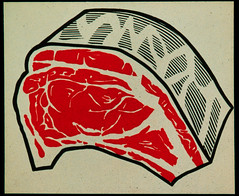March 26th –Cookbooks I’ve Been Reading
At this point there’s no way to reconstruct what I ate for the last six weeks, so I’ll just talk about a few of the many cookbooks I’ve been reading.
Several months ago, I was browsing at Powell’s and came across a treasure: a used copy of Elek Magyar’s classic The Gourmet’s Cookbook, which is one of the finest books ever written on Hungarian cuisine. Magyar, by his own admission, wasn’t a cook himself, but he was a “foodie” who wrote this book in 1932. It didn’t appear in English until the 1970’s. Many people don’t think about Hungarian food when they think about refined haute cuisine, but the food of the Austro-Hungarian Empire was amongst the most ornate cuisine ever produced.
Magyar’s book is similar in many ways to earlier works like Escoffier or the Larousse Gatronomique. It’s not a book that teaches you how to cook. It’s a book that assumes you already know how to cook (and can cook well). It’s an encyclopedic collection of haute Hungarian food, in all of its fat laden glory. There are many recipes per page, because the recipes are really just outlines and often don’t list specific amounts. It’s a fascinating book to read because it covers so much and with incredible authority and surety. Modern readers and cooks may find the food too heavy and unhealthy, but it’s an incredible collection that illustrates the breadth and refinement of Hungarian food. It’s a book, like Escoffier and Larousse, which I’ll read cover to cover but will rarely cook from. (That’s not a bad thing in my eyes). It has already become one of my favorite cookbooks. It’s well worth tracking down a copy.
At the same time that I bought Elek Magyar, I finally bought a copy of Mangoes and Curry Leaves by Jeffrey Alford and Naomi Duguid. I’ve already plugged this incredible book on the food of the Indian subcontinent before, but their books are so good, that they deserve to be plugged on a regular basis. More cookbooks should be as informative and beautiful as theirs are. And unlike many beautiful cookbooks, their recipes actually work as well. The recipes for Pork Vindaloo and Pepper Rassam are amongst the best I’ve seen. I finally bought this book, now you should too (and all of the other fine books they’ve written).
I’m a huge fan of Mark Bittman. His How to Cook Everything is one of my favorite all purpose cookbooks. While it doesn’t have the greatest recipe for everything, it does have good ones for pretty much everything. I use How to Cook Everything often when I need to find a basic recipe as a jumping off point for something that I’m planning. I was happy to see that he now has a How to Cook Everything Vegetarian book out. I got it from the library (OK, my wife got it for me) and was sad when I had to bring it back. Bittman is full of his usual no-nonsense advice and is a champion of demystifying cooking. In particular I loved the sections on legumes and grains. It’s on my short list of cookbooks I need to go buy.
I love dumplings of all sorts and was thrilled with Brian Yarvin’s A World of Dumplings. A lot of single subject cookbooks can seem a little skimpy, but this is a great book with a wide variety of recipes from around the world. Yarvin defines dumplings as anything that’s wrapped in dough, so there are recipes for Asian dumplings, ravioli, samosas, pirogue, empanadas, etc. Although many people may still start with pre-made dumpling wrappers, Yarvin’s enthusiasm will likely convince some people to make their own. In addition to clear instructions and pictures, there are good stories about his search to find authentic recipes and instructions for all of the types of dumplings that he writes about. He had me breaking my bamboo steamer out within a day of getting the book.
In general, I’m wary of most East/West fusion cookbooks because many of them are so bad and have recipes for food that just doesn’t work. (Afterall, not everyone can be Jean-Georges Vongerichten.) I was wary when my wife got Padma Lakshmi’s Tangy Tart Hot and Sweet from the library. After all, Padma Lakshmi is a former super model and had a role in the Mariah Carey movie, Glitter, both of which wouldn’t lead me to believe that she could actually write a decent cookbook. But the book is actually quite good. I didn’t really test many recipes but read through most of them. Many of the recipes are Indian inspired (not surprisingly since she’s Indian), but have clever fusion twists. In general the soup recipes intrigued me the most, although a bunch of the other recipes read well. I was happily surprised with this book.
Wednesday, March 26, 2008
March 26th - Cookbooks I've Been Reading
Posted by
Bill
at
1:05 PM
![]()
![]()
Labels: Brian Yarvin, dumplings, Elek Magyar, how to cook everything, hungarian, Jeffrey Alford, Mark Bittman, Naomi Duguid, Padma Lakshmi
Subscribe to:
Post Comments (Atom)

No comments:
Post a Comment